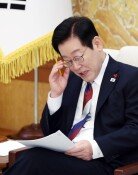Gov¡¯t complacent with economic successes
Gov¡¯t complacent with economic successes
Posted August. 24, 2000 15:06,
The new economic team headed by Jin Nyum has promoted two slogans for the economic policy directions of the President Kim Dae-Jung administration in its latter half. One is ¡°completion of reform,¡± and the other is ¡°new takeoff.¡±
Under these slogans, the team hopes to wrap up reform in the four sectors -- corporate, financial, labor and public -- and at the same time to pave the way for the nation¡¯s sustainable economic growth.
The market, however, has sent indifferent responses. That¡¯s not only because the new economic team¡¯s pledges are no more than enumerating bits of policies being promoted by individual government departments, but because they are leaning to draw only a rosy picture of the future economy.
In this connection, some argue that the government is satisfied too much only with its accomplishments and not facing up to the harsh reality that real economic growth has slowed and foreign investors are giving the country the cold shoulder for delayed corporate and financial reform. Some even sharply criticize that though the new economic team¡¯s reform policy is professedly market-oriented, the announcement delivered August 22 is rather a general gift set lacking in concreteness and philosophy on how to manage the national economy for the next two and a half years.
Rosy picture defies facts:
The government set a goal to place the nation¡¯s economy at a high position among member countries of the Organization for Economic Cooperation and Development by 2003. In line with the advancement of a knowledge- and information-based society, the education environment will be improved to the average level of the OECD member countries, and the implementation of the productive welfare policy will put the level of the national income distributed among the high-ranking OECD members.
Also, the government plans to raise the standard of basic science to the world¡¯s top 10, placing the nation among one of the world¡¯s 10 most powerful knowledge-information societies, as well as to accomplish 100% of housing supply goals.
Coming into the details, however, there are considerable logical loopholes found. For instance, it is a well-known fact that the national income structure has been much deteriorated compared to the times under previous governments, even taking into account the side effects following the fact that the government has put policy priority on tiding over the foreign currency crisis. In truth, the Gini index, which reflects equality in the distribution of wealth, worsened to 0.325 in this year¡¯s first quarter, compared to 0.283 in 1997.
In addition, it is a majority opinion that the government¡¯s plan to lift the national income per capita, which stands at less than US$10,000, to US$15,000 by 2003 is unattainable, given the adjusted annual average GDP growth of 6%, excluding other variables such as foreign exchange rates and consumer prices.
What¡¯s worse, details that the government declared as the four major tasks to be resolved are also mere a compilation of announcements delivered several times by individual government authorities since early this hear, thus lacking in freshness.
For example, the three-year plan for balanced regional development and the plan to activate domestic mergers and acquisitions already were presented in the June announcement for economic policy for the second half. Moreover, dates of implementation of some plans were delayed.
Only fruitful outcome is acknowledgment of problem:
Still, the only consolation is that the government has acknowledged the fact that the nation¡¯s economy is beset with substantial problems. The government conceded that although there has been progress in the macroeconomic sector, the nation has the cards stacked against it in its effort to secure stable economic growth and to grow into a global knowledge and information power.
The government also has admitted that pessimism over the reform for the four major sectors has driven the financial market into jitters, and that domestic small and medium-sized venture startups, as well as companies dedicated to such industries as parts and basic materials, and biotechnology industries are suffering from weak foundations. In addition, the government acknowledged that the economic gap among regions is a task to be urgently tackled.
It is a general consensus that in order for the government¡¯s economic policy to gain public confidence, it should be sought on the basis of acknowledgment of defects, not of satisfaction with the past achievements.







